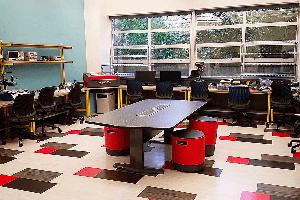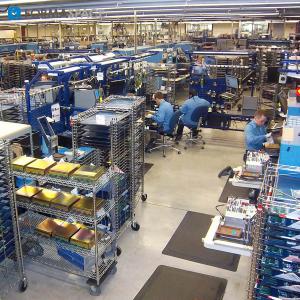
What are the Best University Programs for Starting a Career in Manufacturing?
There is an increasing number of job opportunities in the manufacturing industry. View the list of programs and top universities to start a new career.
AUSTIN, TEXAS, USA, October 14, 2019 /EINPresswire.com/ -- As the Baby Boomer generation retires, an emerging skills gap is tempering growth in American manufacturing. While the shortage of skilled workers may not be good news for manufacturers, it does mean there are an increasing number of job opportunities for the next generation of computer science and engineering students.If you are a student, how can you prepare for one of these top jobs in manufacturing? We take a look at which universities offer the best undergraduate programs to prepare you for a successful technical career in advanced manufacturing.
An undergraduate degree in Industrial Engineering offers a broad, flexible foundation for a career in advanced manufacturing. Individuals with this highly-versatile degree are sought after by many industries that are looking for expertise to make their operations more efficient – by reducing costs and automating processes, for example.
Industrial engineers can specialize in areas such as manufacturing engineering (designing and operating assembly factories); value engineering (reducing costs by optimizing product design, raw materials usage, labor optimization, etc.); as well as supply-chain operations and systems/operations management.
There were 284,600 Industrial Engineers employed in the US in 2018, with 44% working directly in manufacturing roles:
18% Transportation equipment manufacturing
13% Computer and electronic product manufacturing
8% Machinery manufacturing
5% Fabricated metal product manufacturing
According to the Bureau of Labor Statistics, the median annual salary for an industrial engineer is $87,040. (The top 10% earn $132,340 and up.)
Top 10 Undergraduate Schools For Industrial Engineering, Operations And Systems Management Degrees
1. Georgia Institute of Technology (Georgia Tech), Atlanta, Georgia
2. University of Michigan, Ann Arbor, Michigan
3. Purdue University, West Lafayette, Indiana
4. Virginia Tech, Blacksburg, Virginia
5. University of California – Berkeley, Berkeley, California
6. TIE
7. Cornell University, Ithaca, New York
8. Pennsylvania State University, University Park, Pennsylvania
9. University of Illinois, Urbana-Champaign, Champaign, Illinois
10. Stanford University, Palo Alto, California
Mechanical Engineers (ME) are trained as problem solvers who can break down an issue into its individual logical parts, then apply an analytical approach to find new solutions.
For example, undergraduate MEs learn how to gather design requirements and then create viable design alternatives – based on relevant inputs, ranging from material properties, thermodynamic characteristics, weight, cost, etc.
Given their problem-solving background, Mechanical Engineers are highly sought after for roles in product design engineering, manufacturing operations, and automation systems, including robotics.
There were 312,900 Mechanical Engineers employed in the US in 2018, with 32% working directly in manufacturing roles:
14% Machinery manufacturing
11% Transportation equipment manufacturing
7% Computer and electronic product manufacturing
According to the Bureau of Labor Statistics, the median annual salary for a mechanical engineer is $87,830. (The top 10% earn $132,340 and up.)
Top 10 Undergraduate Schools For Mechanical Engineering Degrees
1. Massachusetts Institute of Technology (MIT), Cambridge, Massachusetts
2. Stanford University, Palo Alto, California
3. University of California – Berkeley, Berkeley, California
4. California Institute of Technology (Cal Tech), Pasadena, California
5. Georgia Institute of Technology (Georgia Tech), Atlanta, Georgia
6. University of Michigan, Ann Arbor, Michigan
7. University of Illinois, Urbana-Champaign, Champaign, Illinois
8. Cornell University, Ithaca, New York
9. Purdue University, West Lafayette, Indiana
10. Carnegie Mellon University, Pittsburgh, Pennsylvania
Formaspace builds classroom and laboratory furniture for over 300 leading colleges and universities, including most of the Ivy League institutions.
Electronics And Electrical Engineering. The manufacturing market has become increasingly “electrified” and “electronicified.”
How so?
Nearly every product category today incorporates electronic controls and sensors, while cars and trucks are quickly adopting electric power – and self-driving capabilities to boot. To top it off, our power grid is becoming increasingly dependent on solar panels, wind turbines, and battery storage systems.
Taken together, it’s a growth market for electronics and electrical engineers working in manufacturing.
According to the Bureau of Labor Statistics, the median annual salary for an electronics engineer is $102,700. (The top 10% earn $162,200 and up.)
Top 10 Undergraduate Schools For Electronics And Electrical Engineering Degrees
1. Massachusetts Institute of Technology (MIT), Cambridge, Massachusetts
2. University of California – Berkeley, Berkeley, California
3. Stanford University, Palo Alto, California
4. Georgia Institute of Technology (Georgia Tech), Atlanta, Georgia
5. University of Illinois, Urbana-Champaign, Champaign, Illinois
6. University of Michigan, Ann Arbor, Michigan
7. California Institute of Technology (Cal Tech), Pasadena, California
8. Carnegie Mellon University, Pittsburgh, Pennsylvania
9. Purdue University, West Lafayette, Indiana
10. University of Texas – Austin, Texas
Electronics assembly applications depend on Formaspace workstation installations with built-in ESD protection that protect sensitive electronic equipment from accidental damage due to static discharge.
Today, most manufactured goods are part of a larger, software-powered ecosystem, one that allows us to, for example, control products remotely over the Internet.
But that’s not the only example of how central software has become to the manufacturing industry.
Here are just three more critical examples: Online e-commerce sales channels, just-in-time-delivery supply chains, and numerical quality control systems – all powered by sophisticated computer systems.
To this list, we should also add consumer goods manufacturers – who are increasingly realizing the value of the savvy use of social media and other online tools that allow them to connect directly with customers and establish long-term relationships.
The Bureau of Labor Statistics provides this list of relevant software job categories:
Computer and Information Research Scientists
Computer Network Architects
Computer Programmers
Computer Support Specialists
Computer Systems Analysts
Database Administrators
Information Security Analysts
Information Security Analysts
Network and Computer Systems Administrators
Software Developers
Web Developers
And then there are computer hardware engineers, whose job it is to bridge the world of computer science and computer hardware.
There were 64,400 Computer Hardware Engineers employed in the US in 2018, with 44% working directly in manufacturing roles:
25% Computer systems design and related services
10% Computer and peripheral equipment manufacturing
9% Semiconductor and other electronic component manufacturing
According to the Bureau of Labor Statistics, the median annual salary for a computer hardware engineer is $114,600. (The top 10% earn $172,630 and up.)
Top 10 Undergraduate Schools For Computer Science, Computer Engineering Degrees, Including Computer Hardware Engineers
1. Massachusetts Institute of Technology (MIT), Cambridge, Massachusetts
2. Carnegie Mellon University, Pittsburgh, Pennsylvania
3. University of California – Berkeley, Berkeley, California
4. TIE
5. Georgia Institute of Technology (Georgia Tech), Atlanta, Georgia
6. Stanford University, Palo Alto, California
7. University of Illinois, Urbana-Champaign, Champaign, Illinois
8. University of Michigan, Ann Arbor, Michigan
9. University of Texas – Austin, Austin, Texas
10. Cornell University, Ithaca, New York
If you drop your phone and the glass doesn’t break, you can thank a materials engineer.
Want an electric car that travels over 200 miles between charging stations? Thank a materials engineer for making the motor more efficient and the battery more powerful.
Materials engineering plays an ever more important role in manufacturing, as it’s often the use of advanced material properties that separate the winners from the losers in the marketplace.
There were 27,700 Materials Engineers employed in the US in 2018, with 33% working directly in manufacturing roles:
16% Transportation equipment manufacturing
9% Computer and electronic product manufacturing
8% Primary metal manufacturing
According to the Bureau of Labor Statistics, the median annual salary for a materials engineer is $92,390. (The top 10% earn $148,110 and up.)
Top 10 Undergraduate Schools For Materials Engineering Degrees
1. Massachusetts Institute of Technology (MIT), Cambridge, Massachusetts
2. Georgia Institute of Technology (Georgia Tech), Atlanta, Georgia
3. University of Illinois, Urbana-Champaign, Champaign, Illinois
4. University of California – Berkeley, Berkeley, California
5. TIE
6. University of Michigan, Ann Arbor, Michigan / Northwestern University, Evanston, Illinois
7. Stanford University, Palo Alto, California
8. Cornell University, Ithaca, New York
9. California Institute of Technology (Cal Tech), Pasadena, California
10. Carnegie Mellon University, Pittsburgh, Pennsylvania
Special Mention: Product Design And Industrial Design Programs
Why do consumers pay a premium for an Apple product or a Tesla electric car?
Some might say it’s because they look cool. Or they respond better, e.g. the design of the interface is more intuitive.
If you are attracted to the way a product looks or functions, then you can thank the product designer or industrial designer whose imagination helped guide the product development.
Here are some of the top design programs in the USA.
Top Programs For Product Design And Industrial Design
1. d.school, Stanford University, Palo Alto, California
2. ArtCenter College of Design, Pasadena, California
3. Cranbrook Academy of Art, Bloomfield Hills, Michigan (Graduate Program)
4. Rhode Island School of Design (RISD), Providence, Rhode Island
5. Pratt Institute, Brooklyn, New York
6. Savannah College of Art and Design (SCAD), Savannah, Georgia
7. Carnegie Mellon University School of Design, Pittsburgh, Pennsylvania
8. California College of the Arts (CalArts), Oakland, California
9. Sonoco Institute at Clemson University, Clemson, South Carolina (specializing in Packaging Design)
10. Gerald D. Hines College of Architecture and Design, University of Houston, Houston, Texas
Special Mention: Automation And Robotics Programs
Robotics and automation is a growing field that is changing the manufacturing landscape around the world.
While the core engineering studies programs listed above provide a good foundation for robotics and automation, the following schools have specialized programs in this growing field.
Top Programs For Automation And Robotics
1. Robotics Institute at Carnegie Mellon University, Pittsburgh, Pennsylvania
2. Georgia Institute of Technology (Georgia Tech), Atlanta, Georgia
3. FIRST Robotics Research Center at Worcester Polytechnic Institute, Worcester, Massachusetts
4. The General Robotics, Automation, Sensing and Perception (GRASP) Lab at University of Pennsylvania, Philadelphia, Pennsylvania
5. Rensselaer Polytechnic Institute, Troy, New York
6. California Institute of Technology (Cal Tech), Pasadena, California
7. University of Southern California, Los Angeles, California
8. John Hopkins Whiting School of Engineering, Johns Hopkins University, Baltimore, Maryland
9. University of California – Santa Cruz, Santa Cruz, California
10. Cornell University, Ithaca, New York
Formaspace custom manufactured this “robot highway” that allows robotic pickers to navigate distribution centers at different heights.
Special Mention: Additive Manufacturing (3D Printing) Programs
Now that many 3D printers are capable of producing parts at industrial scale volumes, Additive Manufacturing has emerged as a new discipline in the world of manufacturing.
The following schools either have specialized programs in additive manufacturing or offer significant relevant coursework.
Top Programs For Additive Manufacturing (3D Printing)
1. Purdue University, West Lafayette, Indiana
2. Penn State University, University Park, Pennsylvania
3. Massachusetts Institute of Technology (MIT), Cambridge, Massachusetts
4. Carnegie Mellon University, Pittsburgh, Pennsylvania
5. Ohio State University, Columbus, Ohio
Special Mention: Quality Assurance (QA) Programs
A degree in Industrial Engineering or Computer Science can provide an outstanding foundation for becoming a specialist in Quality Assurance.
But if you are looking for more specialized programs (or schools that offer significant relevant coursework in quality assurance), you might want to check out the offerings from these schools.
Read more ... https://formaspace.com/articles/manufacturing/university-programs-for-manufacturing/?utm_source=einpresswire&utm_medium=content&utm_campaign=article-100919
Mehmet Atesoglu
Formaspace
+5122792792
email us here
EIN Presswire does not exercise editorial control over third-party content provided, uploaded, published, or distributed by users of EIN Presswire. We are a distributor, not a publisher, of 3rd party content. Such content may contain the views, opinions, statements, offers, and other material of the respective users, suppliers, participants, or authors.





